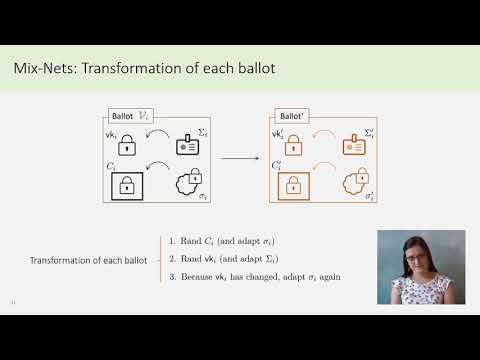CryptoDB
Linearly-Homomorphic Signatures and Scalable Mix-Nets
| Authors: | |
|---|---|
| Download: | |
| Abstract: | Anonymity is a primary ingredient for our digital life. Several tools have been designed to address it such as, for authentication, blind signatures, group signatures or anonymous credentials and, for confidentiality, randomizable encryption or mix-nets. When it comes to complex electronic voting schemes, random shuffling of authenticated ciphertexts with mix-nets is the only known tool. However, it requires huge and complex zero-knowledge proofs to guarantee the actual permutation of the initial ciphertexts in a privacy-preserving way. In this paper, we propose a new approach for proving correct shuffling of signed ElGamal ciphertexts: the mix-servers can simply randomize individual ballots, which means the ciphertexts, the signatures, and the verification keys, with an additional global proof of constant size, and the output will be publicly verifiable. The security proof is in the generic bilinear group model. The computational complexity for the each mix-server is linear in the number of ballots. Verification is also linear in the number of ballots, but independent of the number of rounds of mixing. This leads to a new highly scalable technique. Our construction makes use of linearly-homomorphic signatures, with new features, that are of independent interest. |
Video from PKC 2020
BibTeX
@article{pkc-2020-30323,
title={Linearly-Homomorphic Signatures and Scalable Mix-Nets},
booktitle={Public-Key Cryptography – PKC 2020},
series={Public-Key Cryptography – PKC 2020},
publisher={Springer},
volume={12111},
pages={597-627},
doi={10.1007/978-3-030-45388-6_21},
author={Chloé Hébant and Duong Hieu Phan and David Pointcheval},
year=2020
}

